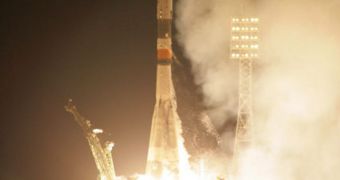On Saturday, astronauts aboard the International Space Station (ISS) had to take manual control of the Progress 37 capsule that was heading their way. The unmanned cargo ship is generally perfectly capable of steering itself in an automated docking process, but a last-minute malfunction hindered its attempt to affix itself to the ISS in this case. RosCosmos cosmonaut, and Expedition 23 commander Oleg Kotov, a veteran of the Russian Air Force, took control of the spacecraft, and set it gently on the orbital facility at 2:30 pm EDT (1830 GMT), Space reports.
Kotov took the “reins” as Progress was some 3,280 feet (1,000 meters) away from the international laboratory. The cargo capsule was carrying some 2,359 kilograms of supplies, including 918 pounds (870 kilograms) of propellant, 110 pounds (50 kg) of oxygen, some 220 pounds (100 kg) of water, and about 3,301 pounds (1,497 kg) of scientific experiments and spare parts. The Russian officials in charge of the new launch said that the capsule also carried a few special packages, in addition to its basic payload. The six-astronaut crew aboard the ISS asked for a number of items, such as candies, books, and new movies to watch before bedtime.
“I found the station and I'm going to bring it into the center of the field of view. I'm just going really slow and taking it very easy,” Kotov radioed to the Russian Mission Control, as experts on the ground kept a close eye on his maneuvers. The cosmonaut handled the 7.4-meter (24-foot) cargo ship flawlessly, and managed to attach it to the Earth-facing port of the Russian-built Pirs module. The crew member took control of Progress 37 only after the spacecraft did not return to correct orientation verification coordinates on its final approach to the station.
Kotov's handling of the situation has been termed by both NASA and RosCosmos as flawless. The space flier even managed to bring the ship in five minutes earlier than planned, due to his piloting skills. “You brought it in from close to 1,000 meters. That's a first time in history,” Mission Control radioed. But the ISS crew will have little time to rest. The new supplies will need to be unloaded and stored in their respective compartments very fast.
Starting this month, station astronauts will have a very busy program, which will include the arrival of the space shuttle Atlantis in its last-ever mission. The orbiter will take off in mid-May, and it will deliver the Russian-built MRM-1 module to the station, which represents one of RosCosmos' last major additions to the $100 billion facility. The module will be installed on the nadir port of the Zarya module, and will serve primarily as a cargo area and docking port.

 14 DAY TRIAL //
14 DAY TRIAL //